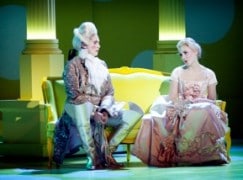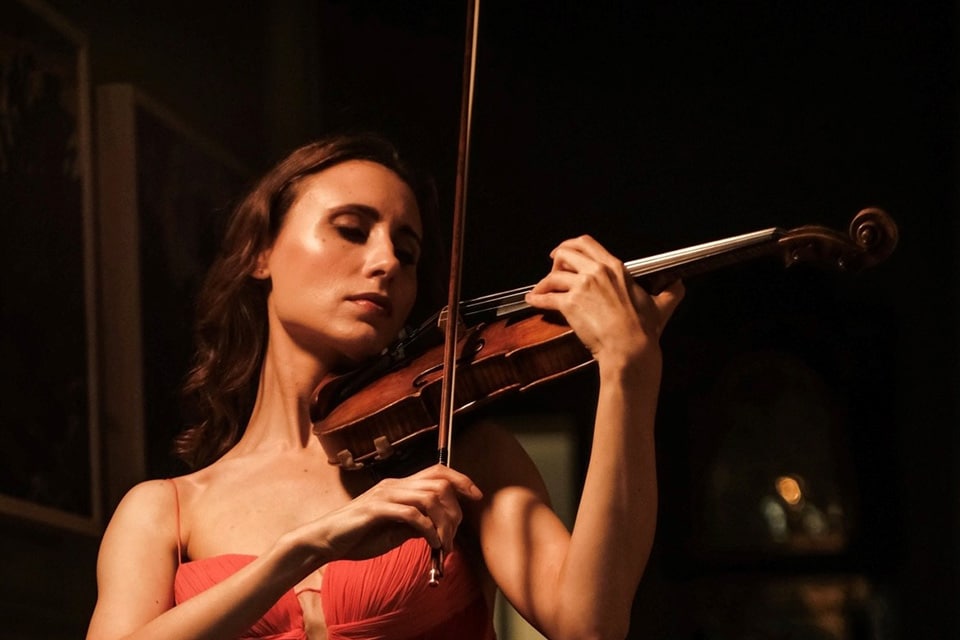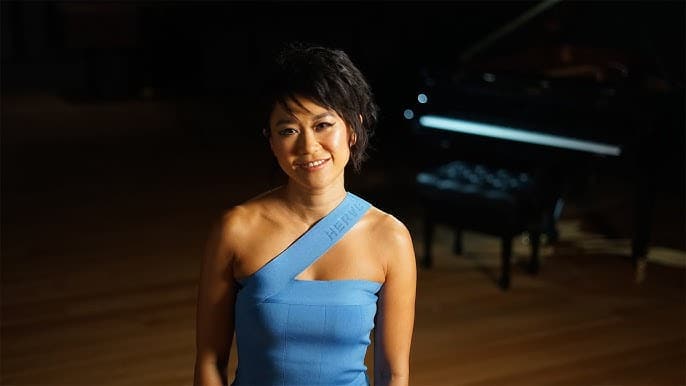Der Rosenkavalier tells three lies about women
mainThere’s a marvellous opinion piece today in the New York Times by the philosopher Martha C. Nussbaum, analysing how Strauss and Hofmannstahl got it all wrong about older women in the character of the Marschallin.
For instance:
So what has this wise woman with what one critic calls “acute sensibilities” and “profound understanding” done? Out of all the men around, she has chosen one who is interested in sex alone, who has no capacity for intelligent conversation, and who has no interest at all in her as a person, except as a sex teacher. Why did she make this choice? No plausible motive is suggested. And this absence of motive, particularly in one so wise, creates the lie: the implicit explanation is that this is the only option she has.
Read on here.






The plot of Rosenkavalier is indeed not very truthful and also not very interesting…. apart for middle-aged spinsters. The elaborate libretto by Von Hofmansthal is – as a libretto – very flawed: too dense, too fussy, with all kinds of word plays which get lost when set to music, and very sentimental. And improbable on many accounts, not only for the Marschallin’s love life. But Strauss, not capable of writing his own libretti, needed a ‘nice story’ as a skeleton to hang his music on, and it is a master piece, in spite of the occasional flaws in the music – the vulgarity here & there, the lack of long-term continuity (everything is composed as short little stretches), some banal themes and utterly trivial musical gestures – not to speak of the totally misjudged ‘Waltzes’. But most of the music is utterly inspired, brilliant, sensationally apt for the stage action, virtuosic, expressive.
Mrs Nussbaum’s article seems correct, but:
“For the Marschallin, love brings neither comedy nor tragedy, only polite resignation.”
This is obviously NOT true. Whatever her ‘mistake’ to have a relationship with a stupid teenager, the Marschallin’s giving-up something she obviously liked very much, does pain her immensily and it is not so much in the words, but in the music, that the scope of her intimate tragedy is revealed. This scene at the end of the 1st act is one of the very best things Strauss has ever composed, because here – for one single time until the Last 4 Songs – he explores emotional depth. And the remarkable thing is, that it is done in an entirely opposite manner of Wagner or Beethoven or any Italian, the music is suggestive and tenderly nostalgic, with harmonic and melodic colours in intimate Mozartian textures, full of invention and feeling. It is tragedy expressed in pastel-like colours, and no trombones. In its discretion, it is close to Debussy’s ‘Pelléas et Mélisande’ which is a riot of discretion.
Strauss did not understand much of women, he loved them for their soprano voices, but his own marriage says it all:
https://en.wikipedia.org/wiki/Richard_Strauss#/media/File:Richard-strauss-and-pauline-and-franz-1910.jpg
That’s why he needed a librettist to work-out some useful story. His ‘women’ in Salome and Elektra are not of his own invention, and in Intermezzo – where he did write his own libretto, for once – he merely had to caricature his own wife who filled-in the blanks of his own idea about the feminine.
You make it sound as if Strauss not writing his own libretti was somehow unusul. Weird.
That is not intended…. but Strauss was often criticized for using inappropriate libretti. Making him entirely responsible for the details of a libretto seems to be unfair.
“his own marriage says it all”
See Intermezzo.
Thank you for posting the presentation of the rose, the best possible answer to Ms Nussbaum’s arguments. Rosenkavalier has probably 30/40 minutes off the most incandescent/sublime moments in music.
And those two singers, hasbben? Unsurpassed.
Thank you for posting the presentation of the rose, the best possible answer to Ms Nussbaum’s arguments. Rosenkavalier has probably 30/40 minutes off the most incandescent/sublime moments in music. All that needs to be said !!
A woman in her 30’s is an ‘aging’ woman in sexual terms? Absolutely hilarious. And wrong.
Quite. Even in the fictional 18th century, let alone the early 20th.
Yes, sexually a woman’s reproduction system is at its nature designed peak in her early twenties, the optimal age to have kids, biologically(!).
That’s just a scientific fact. Not to be confused with ideological and mental issues.
Also, nothing wrong with aging itself, its a matter of perspective.
But aging it is.
I think that’s Kleiber in the pit in that excerpt! xxx
I won’t speculate as to which will be longer remembered and more highly regarded- Rosenkavalier, or Nussbaum’s thoughts on Rosenkavalier.
Nuss-who?
Sorry, I thought that was a suburb of Vienna. That would be Nussdorf. You get there with the D Tram!!
Should women watch Der Rosenkavalier as a guide for their libido? I certainly hope not.
But the Opera News magazine for November 2017 does contain an amusing story in a similar vein, circa 1940s Italy. According to Virgil Thomson, Puccini’s Madama Butterly was “extremely popular in Italy during our occupation of that country, Italian families loving to point out to their daughters the unfortunate results of becoming seriously attached to members of our armed forces.” No doubt their efforts were occasionally successful.
Butterfly, of course, not Butterly
Ms Nussbaum gives the impression that the relationship with Octavian is the Marschallin’s sole indiscretion. I’ve always had the feeling he was just the one who happened to be there when the curtain went up. Naturally she is attached to him but, as in the past, will pull herself together when he’s gone and move on to her next lover, one possibly more in line with the journalist’s expectations. Not all of our partners are ideal matches.
Indeed. There are rumours that not the opera, but the Marschallin lied, and that she had many lovers, of all ages, before and after the Rosenkavalier episode. She gives herself away in the last scene of act 1 where she claims to go to visit her uncle Greifenklau, who supposedly is old and lamed, but who in reality is only 37 and at that very moment on a hunting expedition with the Feldmarschall. She just wanted to get rid of Octavian in a discrete way.
There is a line in Act I somewhere, where Octavian is getting possessive and she tells him not to be like “all the other men.” I always figured that meant he was one in a series.
Indeed he was….!
Why nobody talks about the lies about men, that also are in this opera (and others)?
Silly stuff, really, and typical of the sort of corner that, thanks to identity politics, a lot of US cultural commentary has backed itself into lately. No sense that the opera dates from an era with different mores, and in itself represents a completely different era; no willingness to look beyond the central thesis (and to see, perhaps, that Octavian is capable of interesting conversation – as in Act 2 – of creativity, of presenting himself imaginatively in different personas). No sense that a woman (of any age) might choose to take a (temporary, as Octavian clearly is) lover purely because she finds him attractive and amusing and with no intention, necessarily, of finding intellectual fulfilment (The Marschallin continually refers to him in terms that suggest she sees him as a child – now there’s something that might be interesting to unpack. Who’s using who, in a relationship between a powerful, well-connected older woman and a naive 17-year old boy?).
And no sense, above all, of the tension between artificiality and reality, social fiction and emotional truth – of ambiguity – that’s surely central to the opera’s entire meaning. But then, many US commentators seem to struggle with ambiguity these days. If your standard approach to cultural criticism is “Here’s a dead white European male masterpiece; here’s a set of received academic ideas – how do we use one to dismantle the other?” – this is where you tend to end up. In the shallows.
+1
+2
+3
+4
You seem to have hit the jackpot! +plus
It’s the Rosenkavalier Kool Aid!! 🙂
Thank you for this! Very sad that a supposedly thoughtful writer wouldn’t bother to learn what DER ROSENKAVALIER is actually all about, rather than just skim over the surface and use her incorrect assumptions as a straw man for her own purposes. If she had bothered to look more deeply into the opera she might have realized that the Viennese are on to something when they say, “Everything you need to know to get through life can be found in the libretto to DER ROSENKAVALIER.”
That last bit is very silly, whether it is Viennese saying it or anybody else.
Really very good comments.
It’s spelt Hofmannsthal!
Many entertainment venues employ the device, “suspension of disbelief”. It was used in Rosenkavalier, SO WHAT?
True, but we also expect from good opera that it says something about the human condition, otherwise it would merely be entertainment.
Funny how Nussbaum buys into a couple of lies herself:
(a) The myth that a woman’s sexual life comes to an end at 25 is universally acknowledged, even as it is universally marketed. (I remember as a youngster seeing an ad on TV for some kind of moisturizer that promised to “help skin over 25 look younger.” I remember thinking “Younger than 25?! What does it do, give you acne?”) It’s clearly not the case with the Marschallin, nor do Strauss & von Hoffmannsthal portray her that way. True, she talks about the relentless progress of time in her famous Act I monologue, but nowhere in the opera (if I remember correctly) does she say “ah well, that’s that — no more sex for me.”
(b) That said, she is 15 years older than he is, and has been in a loveless marriage since he was a baby (if he was even born yet — Sophie is described as being only 15). That kind of life will grow you up in a hurry. The maturity gap between them is much wider than the age gap, IMHO. He really is childish until he meets Sophie and starts to grow up.
(c) I see no indication that Octavian is going to be the Marschallin’s last affair. As somebody said in the comments for the NY Times article, as portrayed by Fleming, she even takes an appraising look at Sophie’s father the moment she’s done with Octavian. “Let’s go for a ride around the park” is one of the oldest pickup lines in the book, if you want to look at it that way. (It would certainly sound like a pickup line if a man said it to a woman.)
(d) Along with (c), I see no indication that she had to “settle” for a mere boy incapable of intelligent conversation, etc. It would be totally accepted if a male character of her age was given an aria about how the charms of a young, naive, shall-we-say enthusiastic girl are utterly different from those of a mature, experienced woman who knows what she’s doing; and if the opera showed him moving on from a sweet young thing to an alluring woman old enough to be her mother (i.e. his own age), no eyebrows would be raised.
Nussbaum seems to have bought into the idea that, because of who wrote this opera and when it was written, that the authors (composer & librettist) must have fallen unthinkingly into the literary conventions of their day. The more I read the article, the more it looks to me like they were slyly subverting those conventions and she’s the one missing the point.
In (a) I meant to say that the myth that a woman’s sexual life comes to an end at age 25 is universally acknowledged to be a myth, even while it is universally marketed.
Hear, hear. +1
Very apt comments.
For women to grow-up within opera and develop maturity, is quite hard, given the circumstances and limitations defined by the librettist. Of the woman in Schoenberg’s Erwartung we know nothing, the girls in Cosi who suffer from bad eyesight seem to have no background either, and about Brünhilde’s educational trajectory audiences are left in the dark although there is a generous amount of talk in the Ring that goes into any direction. The restrictions put upon women in opera plots must be quite damaging, and no wonder they end-up as Salome, Elektra and the protagonistesse in Feldman’s Neither, whose psychiatric condition should be a warning to any woman ambitious to end-up in an opera plot:
http://www.youtube.com/watch?v=0exs9F-888s
Völliger Blödsinn diese ganze Diskussion, einfach geniale Musik und Ende.
Only if you listen to the music and ignore the plot. But opera is a package with different elements.
Opernlibrettos sind keine philosophische Traktate.
stimmt!